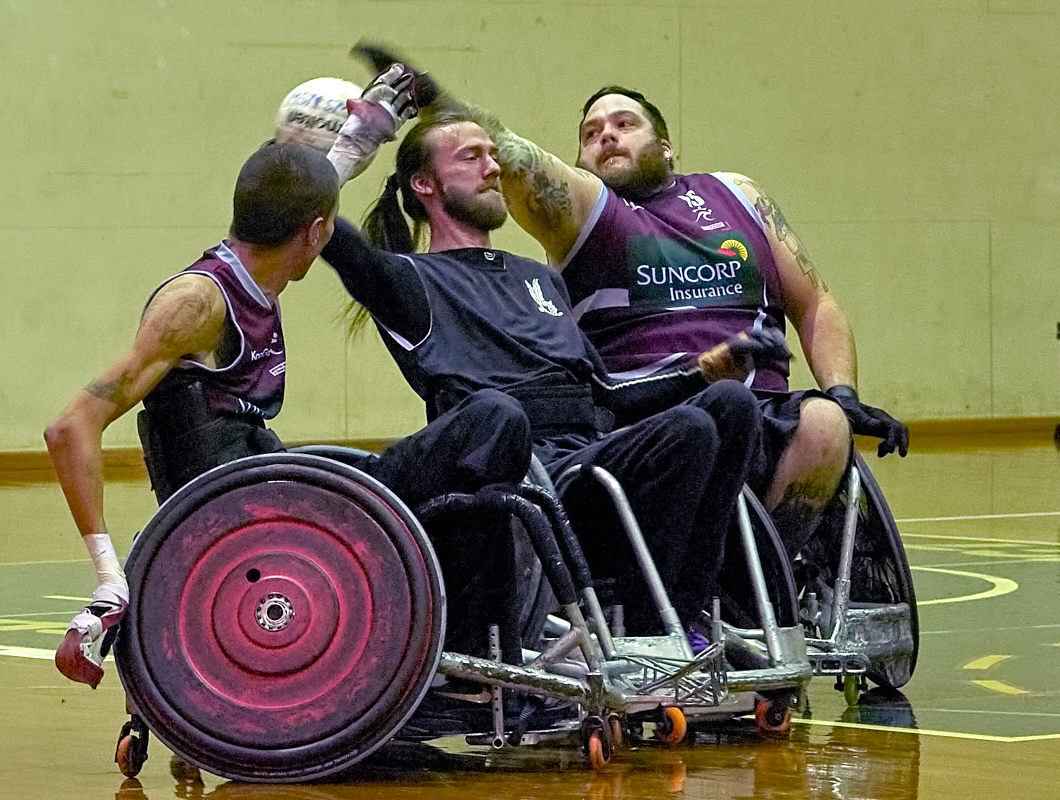Look beyond disability
Our staff and students with disabilities are remarkable and are not solely defined by their disability. Read about our current students, staff and alumni and the contributions they are making to the Griffith community and beyond. Want to share your story? Contact us disability@griffith.edu.au
Remarkable stories
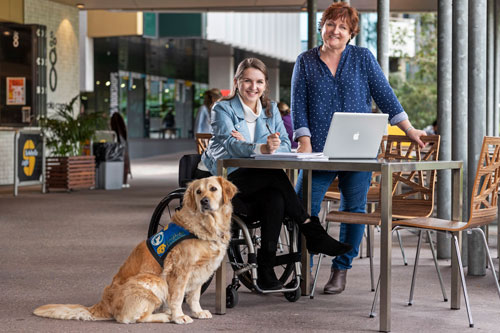 Erin Condrin: Undergraduate | Advocate | Volunteer
Erin Condrin: Undergraduate | Advocate | Volunteer
Lacey helps to break the ice with people who may feel a little wary about talking with me so that’s great, I am really lucky to have her.
Read about Erin Condrin (pictured above) who comes to uni with her assistance dog Lacey and is enrolled in a Bachelor of Psychological Science.
Assistance dogs like Lacey enable independence for students with a wide range of disabilities or health conditions.
Over generations we have become used to people who are blind using guide dogs. In more recent times, the value of assistance animals to support and keep safe people with a range of disabilities has been recognised. In particular, some people with physical disabilities use dogs for assistance with mobility and with carrying or retrieving objects.
Some people living with epilepsy use assistance dogs to alert them in advance of an episode so that they can situate themselves safely and to care for them during and after a seizure. The use of assistance animals for people who have Post Traumatic Stress Disorder and severe anxiety is also growing.
Some things you should know about assistance animals.
- Do speak to the owner/handler
- Don't touch the assistance animal without permission - it is on duty
- Don't offer food to a service animal
- Don't assume a service dog that is napping is off duty.
- It is illegal to discriminate against a person with an assistance animal under the Disability Discrimination Act 1992
- An assistance animal should be certified or have some identification to ensure it is an assistance animal
Cameron Whittaker: Mentor | Advocate | Wheelchair rugby player
Sometimes having a disability comes with predetermined stereotypes or certain characteristics but as soon as you are on the court, everyone is equal.
Cameron is the definition of determined. He is in his final year of Bachelor of Social Work at Logan and represents Queensland in wheelchair rugby. He is also a father and finds time to mentor fellow students at Griffith.
The 29 year old Beaudesert local has been playing wheelchair rugby since 2014 and his team the Queensland Cyclones have played again state teams and international squads in Japan, Canada and New Zealand. Cameron has his sights set on the Australian squad.
Cameron will play in several events in 2018 including the GIO Wheelchair Rugby National Championship in October.
“I was pretty happy to get picked to compete again this year and this experience will help me develop as a player,” Whittaker said.
Whittaker’s achievements did not come easily as he trained nine times a week on the court with former Australian captain for wheelchair rugby Ryan Scott, and spent a lot of time in the gym building his strength.
The athlete said he has had a disability since birth similar to motor neurone disease. He has been in a wheelchair since the age of 13, and was told his muscles and nervous system would deteriorate over time.
Aspiring to follow his family’s tradition to play rugby union, Whittaker said he thought playing sport was an unattainable goal until he was introduced to wheelchair rugby.
“I went to a ‘come and try’ day and have loved the sport ever since,” he said.
“Sometimes having a disability comes with predetermined stereotypes or certain characteristics but as soon as you are on the court, everyone is equal,” he said.
He balances his sport with studies in the Bachelor of Social Work. He started out in a Bachelor of Human Services at Griffith in 2006 and then switched.
“I felt the Bachelor of Social Work would give me greater scope to follow my career goals" says Cameron.
Cameron says balancing his sporting and study commitments would be harder without support from Griffith’s Disabilities Service and Griffith’s Sports College.
“I get support with materials in alternative formats and assistive technology like notetaking software. Sometimes I need to ask for extensions on assignments but who doesn’t from time to time.” says Cameron.
Cameron is a great role model for future students and is employed by Student Diversity and Inclusion to work with prospective students in Uni-Reach schools and at the Tertiary Education Experience to support students from diverse backgrounds to consider uni.
“Cameron is a warm and friendly mentor. Future students can identify with him because he has that fierce determination. He hasn’t come straight from school, he has a disability, and like other students experiences financial challenges. He is open about how challenging it can be to juggle uni with other things like work and family” says Gabrielle O’Brien, Manager, Student Diversity and Inclusion.
“I really enjoy working with young people and encouraging others to chase their dreams. The work I do as a mentor enhances my studies and I am happy to see students who I have met at TEE eventually enrol.”
Find out more about Cameron’s rugby goals.
Picture: student supplied
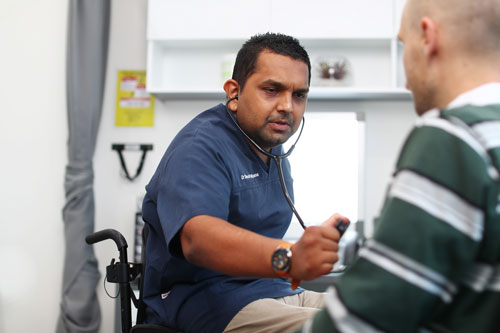 Dr Dinesh Palipana: Doctor | Graduate | Trailblazer
Dr Dinesh Palipana: Doctor | Graduate | Trailblazer
Medicine is so broad with so many fantastic options. Luckily I have some fantastic people around me at Griffith, who have been great advocates of me, as well as my amazing mother who has always been there for me.
Dinesh graduated from his medical degree in 2016 and is only the second doctor to practice in Australia as a quadriplegic.
His story was recently covered by the ABC’s Australian Story and recounts his determination after a life-changing accident in 2010.
A traffic accident on Brisbane’s Gateway Motorway left him without feeling or movement from the chest down.
After many days in intensive care and in the high dependency unit, Dinesh spent a gruelling seven months in the PA Hospital’s spinal unit where he received regular physio and occupational therapy.
“I knew I’d been paralysed before anyone even mentioned it to me, I just didn’t realise it was to the extent of becoming quadriplegic. Even in the ambulance, the first thing that occurred to me was, I still need to get this medicine degree done and get on with my career.”
Dinesh and his mother Chithrani found themselves leaving their home in Australia to go to their country of origin Sri Lanka, where Dinesh had decided to go to take a break and think about what the next move would be.
“It was a dark time of my life; but I knew I had to make the best of what I was left with and all the while I had some great friends around me plus wonderful support from my mum, who has really given up so much of her life for me.”
Dinesh spent four years in Sri Lanka but he never waned in his determination to finish his degree and kept in contact with the Griffith School of Medicine and Dentistry.
“Professor Harry McConnell and others from the School of Medicine and Dentistry were fantastic in communicating to me about how it could work and I had a lot of support from Griffith’s Disabilities Service as well.”
Dinesh was warmly welcomed back to Griffith, and erased any doubts he could achieve his goals. Despite a five-year break from medicine he aced his mid-year exams.
He eventually graduated with the Clinical Sub-Dean’s Award for Clinical Excellence, and spent a term doing radiology at Harvard University.
Sharon Garside from Griffith’s Disabilities Service says “We put a range of supports in place to assist Dinesh including alterative formats for his learning materials; exams in an accessible room with an individual invigilator; extra sessions for troubleshooting procedures in a clinical skills environment; accessible areas in the medical school; and assistive technology like Dragon medical text-to-speech software, headsets and other devices.”
Like many students with disabilities who register with the Disabilities Service, Dinesh’s abilities were assessed and a customized plan put in place that would help him successfully complete his studies. Adjusting the supports and tools as he progressed through is degree and as he became more proficient.
“While we provide reasonable adjustments it’s really the student is doing the hard work of managing all the elements of their study, their disability, and all the usual things student life entails. Dinesh has been a very determined and focused student.” says Ms Garside.
Although classified as a quadriplegic, Dinesh has some feeling and movement of his forearms. He is able to feed himself and get around in his wheelchair without help, having learnt various intricate ways of getting around the lack of hand movement over the past six years. Being able to utilize assistive technologies also made it easier for Dinesh to manage his study and clinical placements.
“It does take me longer than most to get myself ready in the morning and I need help for that, but as far as medical duties go, I can carry out a good medical examination and consultation on a patient.
Dinesh started his first job at the Gold Coast University Hospital in 2017 and is loving his job. He is planning to specialise in radiology.
“Medicine is so broad with so many fantastic options. Luckily I have some fantastic people around me at Griffith, who have been great advocates of me, as well as my amazing mother who has always been there for me.”
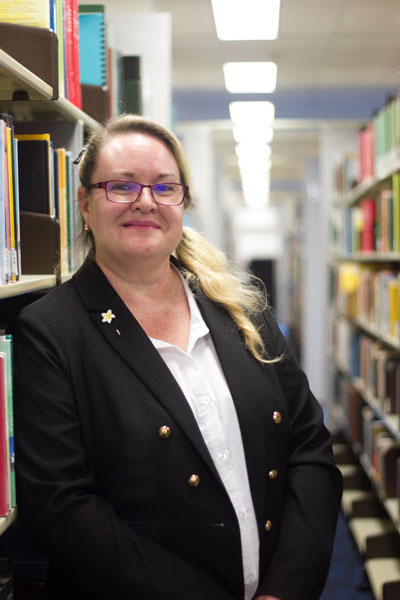 Julia Robertson: Mentor | Artisan | Student
Julia Robertson: Mentor | Artisan | Student
My greatest challenge has been adapting to my 'new normal' and accepting that I am not the same as other students.
Julia Robertson is a current student at Griffith University, studying a Bachelor of Psychological Science. It was after lifesaving brain surgery to remove a brain tumour in 2011 that Julia came to enrol at Griffith, unfortunately the surgery caused a loss of long and short term memory due to an intra-operative bleed.
Despite this, 17 months after her surgery, Julia powered through and enrolled in a dual Certificate III Business and Business Administration in hope to learn new things and recover her memory diligence. After successfully completing the course, Julia wanted to pursue her passion of finding a cure for people living with a brain tumour, this lead to her enrolling in a Certificate IV Adult Tertiary Preparation at Loganlea TAFE and applying to Griffith Universities Bachelor of Science (Clinical Science). Julia completed her TAFE course with honours across all 10 units and was accepted into the Bachelor of Science at Griffith.
Life hit a road block for Julia at this point, after she discovered that her brain was no longer able to manage and retain abstract concepts and after two very serious attempts to complete chemistry she transferred to her current degree of Psychological Science.
The greatest challenge Julia has faced as a student thus far has been having to adapt to her ‘new normal’ and accepting that she was not the same as other students. Her ‘new normal’ now consisted of double vision, impaired hearing and having to carefully manage her energy to be able to achieve her best. She has also found that she is only able to manage three courses a trimester instead of a traditional load of four.
When first starting a Bachelor of science, Julia was a Uni-Key mentee, finding the experience to be vital. Since then, she has become a mentor herself, been a part of the annual TEE (Tertiary Education Experience) program, been a mentor for the School of Psychology and at the end of 2017 was lucky to be offered a student sponsorship at the EPHEA (Equity Practitioners in Higher Education Australasia) conference. It was here she was able to network with other universities across Australia and New Zealand and hear about new initiatives put in place for students and staff from diverse backgrounds at Griffith and other universities.
Julia is on track to complete her degree by the end of 2019, she hopes to pursue honours in 2020 and go on to Masters and PhD from there. She has a keen interest in research and passion for psycho-oncology and palliative care. Last year she volunteered in the Health and Psychology Innovations (HaPI) research lab run by Dr Kyra Hamilton which she called an invaluable experience.
She is a part of an online community for the specific type of brain tumour she has had since 2009 and has since started a complimentary group for people living in Australia and organises face-to-face meetings to offer support. Julia has also been working with the Brain Tumour Alliance Australia (BTAA) as one of their QLD representatives, attending Cancer Council Queensland brain tumour support meetings and co-ordinating the introduction of a new poster prize supported by the BTAA cooperative Trials Group for Neuro-Oncology (COGNO).
Recently, Julia has regained the ability to knit and crochet so she makes beanies and other warm items to send out to Alice Springs to keep the Indigenous community warm in the winter.
Reference: Story by Luisa Ausage, student, Bachelor of Journalism
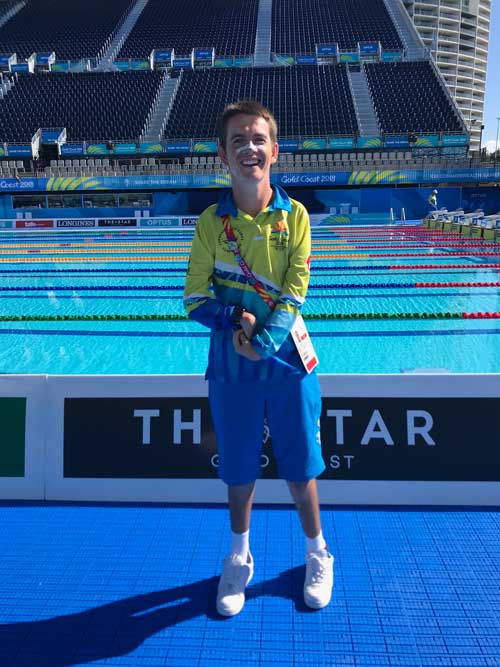 Harry Rodgers: Sportsperson | Student | Events Professional
Harry Rodgers: Sportsperson | Student | Events Professional
“I really wanted to prove to myself I could do it. My disability actually made me more determined to succeed and is my main motivator to keep going when everything seems extremely difficult.”
Harry Rodgers is a second year student in Griffith’s Bachelor of Business/ Diploma of Languages (Japanese) who recently completed an internship at the 2018 Commonwealth Games.
Harry is one of around 200 students who completed an internship at the Commonwealth Games working in Spectator Services.
“University isn’t just about sitting in lectures and hitting the books. These internships have enriched my studies and directly align with my studies.”
“I have amassed such a vast wealth of industry knowledge in such a short period. It has also provided me with networks with industry professionals.”
Harry is majoring in Sports Management and Marketing because he has a passion for sports. “My degree will allow me to merge my passion with a career is highly engaging and will provide me with opportunities to travel”.
“Since I was a kid I have always played sports. I am amazed at the camaraderie and social impacts sports can have for both individuals and community-wide.”
Initially Harry wasn’t sure what he wanted to do after school. He enrolled in various courses through TAFE developing good study habits and using his TAFE study to get into Griffith.
When asked whether his disability made him hesitant about university he says “I was concerned about fitting in and making friends. However, the Griffith community is amazing and so accepting – anyone can make friends.”
When he first started at university Harry felt a bit under-confident in his academic ability and was worried he might not be able to keep up.
“A major concern was my disability and whether I would be able to complete exams in the allotted time. I talked to Disability Services and we worked together to ensure I was on a level playing field.”
But Harry really wanted to challenge himself, open up opportunities, met new people and carve out a career path. “I really wanted to prove to myself I could do it. My disability actually made me more determined to succeed and is my main motivator to keep going when everything seems extremely difficult.”
Harry’s advice for prospective students is to give it a go. “University can seem like such a daunting experience but my advice is to just do it! It is such a special time in your life and opens so many opportunities you thought may not have been possible. You will look back and be so proud of yourself.”
Picture: student supplied
Remarkable stories
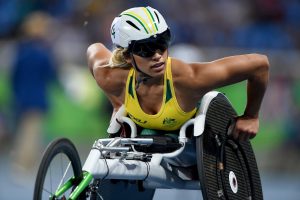
Madison de Rozario: Student | Champion | Role model
"I had most of it done but hadn’t thought of requesting an extension, and it was due,” the 24-year-old Griffith business student says. An email from JFK to her tutor back in Australia secured the short extension required."
Gold Coast 2018 Commonwealth Games (GC2018) gold medalist, Madison de Rozario, won two gold medals in the Women's 1500 meter T54 and the Marathon T54.
Despite her elite sports career Madison was still thinking about how to balance her competition and studies. Students are encouraged to talk to their Course Convenors or Student Disability and Accessibility for assistance with reasonable adjustments.
Madison is also enrolled in a Business degree and gets support with the Griffith Sports College. Griffith's Sports College supports a range of elite athletes including paralympians and para-athletes.
Madison has a long list of accolades including silver medals at the 2008 Beijing and 2016 Rio Paralympics, and gold, silver and bronze medals at the World Para-athletics in Doha, London and Lyon.
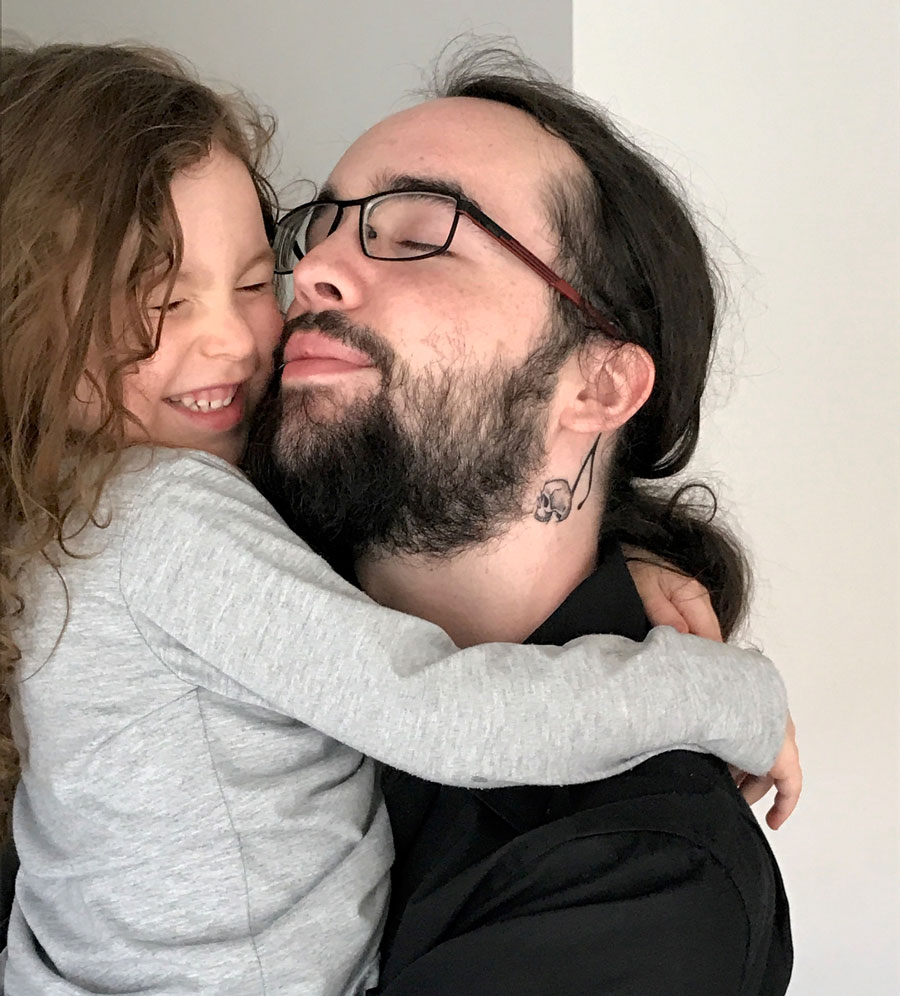
Luke Jones
"I hope to use all the bad experiences in my life to try and ensure children don't have similar experiences to some of mine."
Bachelor of Psychological Science student Luke Jones share his stories about his life, from dealing with being homeless as a teen, becoming a single father at the age of 19 to studying at university.
Find out more about Luke here.
